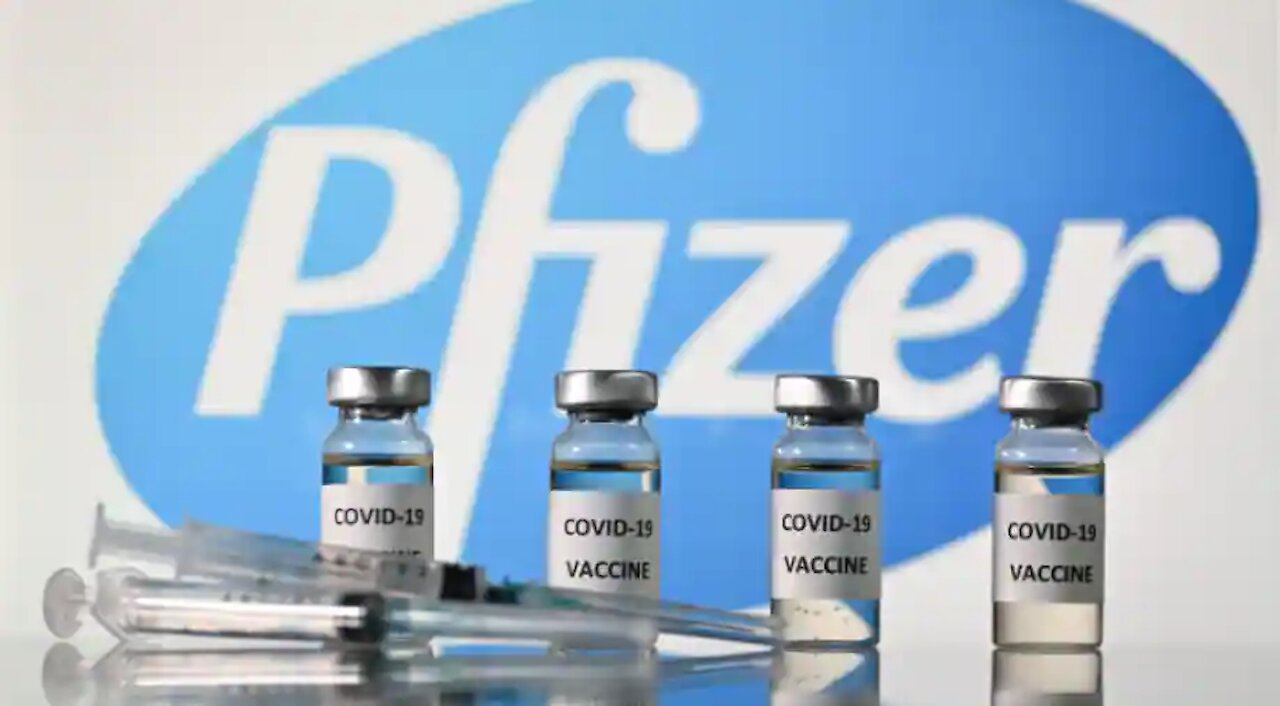Premium Only Content

‘Held to ransom’: Pfizer plays hardball in Covid-19 vaccine negotiations with Latin America
Pfizer has been accused of “bullying” Latin American governments during negotiations to acquire its Covid-19 vaccine, and the company has asked some countries to put up sovereign assets, such as embassy buildings and military bases, as a guarantee against the cost of any future legal cases, according to an investigation by the U.K.-based Bureau of Investigative Journalism.
In the case of one Latin American country, demands made by the pharmaceutical giant led to a three-month delay in a vaccine deal being reached. For Argentina and Brazil, no national deals were agreed to at all with Pfizer. Any hold-up in countries receiving vaccines can lead to more people contracting Covid-19 and potentially dying.
Officials from Argentina and the other Latin American country, which cannot be named as it has signed a confidentiality agreement with Pfizer, said the company’s negotiators demanded more than the usual indemnity against civil claims filed by citizens who suffer serious adverse events after being inoculated. They said Pfizer also insisted the governments cover the potential costs of civil cases brought as a result of Pfizer’s own acts of negligence, fraud, or malice. In Argentina and Brazil, Pfizer asked for sovereign assets to be put up as collateral for any future legal costs.
One government health official who was present in the unnamed country’s negotiations described Pfizer’s demands as “high-level bullying” and said the government felt like it was being “held to ransom” in order to access lifesaving vaccines.
Campaigners are already warning of a “vaccine apartheid” in which rich Western countries may be inoculated years before lower-income regions. Now, legal experts have raised concerns that Pfizer’s demands amount to an abuse of power.
“Pharmaceutical companies shouldn’t be using their power to limit lifesaving vaccines in low- and middle-income countries,” said Lawrence Gostin, a law professor at Georgetown University and director of the World Health Organization’s Collaborating Center on National and Global Health Law. “[This] seems to be exactly what they’re doing.”
Protection against liability shouldn’t be used as “the sword of Damocles hanging over the heads of desperate countries with a desperate population,” he added.
Pfizer, which partnered with BioNTech, a German biotech, to make the vaccine, has been in talks with more than 100 countries and international bodies, and has supply agreements with nine countries in Latin America and the Caribbean: Chile, Colombia, Costa Rica, Dominican Republic, Ecuador, Mexico, Panama, Peru, and Uruguay. The terms of those deals are unknown.
Pfizer declined to comment on the allegations about its demands in negotiations, citing “ongoing negotiations which are private and confidential.”
The company told the Bureau in a statement: “Pfizer and BioNTech are firmly committed to working with governments and other relevant stakeholders to ensure equitable and affordable access to our COVID-19 vaccine for people around the world.” The company said that in addition to the nine Latin American countries with which it has struck supply agreements, it has “allocated doses to low- and lower-middle-income countries at a not-for-profit price, including an advance purchase agreement with COVAX to provide up to 40 million doses in 2021.” COVAX is a global initiative to pool purchasing power and ensure vaccine access for low-income countries. “We are committed to supporting efforts aimed at providing developing countries with the same access to vaccines as the rest of the world,” Pfizer said.
Most governments are offering indemnity — exemption from legal liability — to the vaccine manufacturers they are buying from. This means that a citizen who suffers an adverse event after being vaccinated can file a claim against the manufacturer and, if successful, the government would pay the compensation. In some countries people can also apply for compensation through specific structures without going to court.
This is fairly typical for vaccines administered in a pandemic. In many cases, adverse events are so rare that they do not show up in clinical trials and only become apparent once hundreds of thousands of people have received the vaccine (a 2009 H1N1 flu vaccine, for example, was eventually linked to narcolepsy). Because manufacturers have developed vaccines quickly and because they protect everyone in society, governments often agree to cover the cost of compensation.
However, the government officials from Argentina and the unnamed country who spoke to the Bureau said Pfizer’s demands went beyond those of other vaccine companies, and beyond those of COVAX, which is also requiring its member countries to indemnify manufacturers. This presents an additional burden for some countries because it means having to hire specialist lawyers, and sometimes pass complex new legislation, so manufacturers’ liabilities can be waived.
‘An extreme demand’
Pfizer asked for an additional indemnity from civil cases, meaning that the company would not be held liable for rare adverse effects or for its own acts of negligence, fraud or malice. This includes those linked to company practices — say, if Pfizer sent the wrong vaccine or made errors during manufacturing.
“Some liability protection is warranted, but certainly not for fraud, gross negligence, mismanagement, failure to follow good manufacturing practices,” said Gostin. “Companies have no right to ask for indemnity for these things.”
Mark Eccleston-Turner, a lecturer in global health law at Keele University in England, said Pfizer and other manufacturers have received government funding to research and develop the vaccines and are now pushing the potential costs of adverse effects back on to governments, including those in low- and middle-income countries. (Pfizer’s partner, BioNTech, was given $445 million by the German government to develop a vaccine and the U.S. government agreed in July to preorder 100 million doses for nearly $2 billion, before the vaccine had even entered Phase 3 trials. Pfizer expects to make sales of $15 billion worth of vaccines in 2021.)
In Eccleston-Turner’s opinion, it looks like Pfizer “is trying to eke out as much profit and minimize its risk at every juncture with this vaccine development then this vaccine rollout. Now, the vaccine development has been heavily subsidized already. So there’s very minimal risk for the manufacturer involved there.”
Related: Covid-19 vaccination rates follow the money in states with the biggest wealth gaps, analysis shows
The Bureau spoke to officials from two countries, who all described how meetings with Pfizer began promisingly but quickly turned sour, and reviewed a report by the Brazilian Ministry of Health.
The Argentinian Ministry of Health began negotiating with the company in June and President Alberto Fernández held a meeting with the company’s general manager for Argentina the following month. During subsequent meetings Pfizer asked to be indemnified against the cost of any future civil claims, said an official from the president’s office. Although this had never been done before, the country’s Congress passed a new law in October allowing for it. However, Pfizer was not happy with the phrasing of the legislation, according to the official, who declined to be identified because the negotiations were confidential. The government believed Pfizer should be liable for any acts of negligence or malice. Pfizer, said the official, disagreed.
The government did offer to amend the existing law to make it clear “negligence” meant problems in the distribution and delivery of the vaccines. But Pfizer was still not satisfied. It asked the government to amend the legislation through a new decree; Fernández refused.
“Argentina could compensate for the vaccine’s adverse effects, but not if Pfizer makes a mistake,” said the official, who has detailed knowledge of the negotiations. “For example, what would happen if Pfizer unintentionally interrupted the vaccine’s cold chain [of -70 Celsius during transport and storage] … and a citizen wants to sue them? It would not be fair for Argentina to pay for a Pfizer error.”
The official said talks soon became tense and complicated: “Instead of giving in on some points, Pfizer demanded more and more.” In addition to the changes sought in the new law, it asked Argentina to take out international insurance to pay for potential future cases against the company (countries were also asked by vaccine makers and the WHO to do this during the H1N1 outbreak).
In late December, Pfizer made another unexpected request: that the government put up sovereign assets — which might include federal bank reserves, embassy buildings, or military bases — as collateral.
“We offered to pay millions of doses in advance, we accepted this international insurance, but the last request was unusual: Pfizer demanded that the sovereign assets of Argentina also be part of the legal support,” the official said. “It was an extreme demand that I had only heard when the foreign debt had to be negotiated, but both in that case and in this one, we rejected it immediately.”
The failed negotiations mean Argentinian citizens, unlike those in neighboring countries, do not have access to Pfizer’s vaccine, leaving them with Russia’s Sputnik V vaccine, AstraZeneca’s vaccine, and those delivered through COVAX. The government is also negotiating to acquire vaccines from Moderna, Sinopharm, and CanSino.
“Pfizer misbehaved with Argentina,” said Ginés González Garcia, Argentina’s former minister of health. “Its intolerance with us was tremendous.”
-
 1:54
1:54
WMAR
3 years agoPfizer COVID-19 vaccine for adolescents
4604 -
 2:31
2:31
KGTV
4 years agoFDA approves Pfizer COVID-19 vaccine
7745 -
 1:13
1:13
Reuters
3 years agoAustralia approves Pfizer COVID-19 vaccine
4004 -
 2:40
2:40
KJRH
3 years agoPfizer announces COVID-19 vaccine effective among younger population
3003 -
 3:05
3:05
KMTV
4 years agoCOVID-19 Pfizer vaccine arrives in Nebraska
2021 -
 2:00
2:00
WCPO
4 years agoPfizer: COVID-19 vaccine 90% effective
2.75K15 -
 2:03
2:03
KGTV
4 years agoPfizer announces COVID-19 vaccine progress
3.53K -
 1:31
1:31
Newsy
4 years agoU.K. Approves Pfizer and BioNTech's COVID-19 Vaccine
5574 -
 2:43
2:43
KTNV
4 years agoPfizer announces more information about COVID-19 vaccine
21.3K4 -
 8:31:37
8:31:37
G2G Gaming Channel
22 hours agoGive me my Helmet, Im going in!! #RumbleGaming
141K3